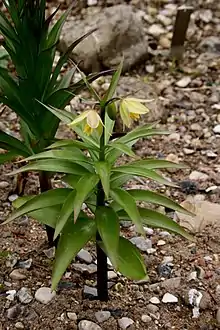Fritillaria raddeana
Fritillaria raddeana is a perennial herbaceous bulbous plant, distributed in Iran, Turkmenistan and Kashmir. It is a species in the genus Fritillaria, in the lily family Liliaceae. It is placed in the subgenus Petilium. Resembling Fritillaria imperialis (crown imperial), but shorter, it is sometimes referred to as the dwarf crown imperial.
| Fritillaria raddeana | |
|---|---|
 | |
| Scientific classification | |
| Kingdom: | Plantae |
| Clade: | Tracheophytes |
| Clade: | Angiosperms |
| Clade: | Monocots |
| Order: | Liliales |
| Family: | Liliaceae |
| Subfamily: | Lilioideae |
| Tribe: | Lilieae |
| Genus: | Fritillaria |
| Species: | F. raddeana |
| Binomial name | |
| Fritillaria raddeana | |
| Synonyms[4][5][1] | |
| |
Description
The inflorescence forms an umbel of 10–20 pendent bell-shaped flowers with six tepals that are yellowish to green. Nectaries 2–3 mm in diameter. Stem of about 2 1/2' feet (50–80 cm) in height. The umbel is topped with a pineapple-like tuft of narrow leaf-like bracts. On the stem are shiny, glaucous, lanceolate, pale green alternate leaves, up to 5 " in length. The plant has a disagreeable odor. The chromosome number is 2n = 24 [6][7]
Taxonomy
In 1874 Baker had subdivided genus Fritillaria into ten subgenera. In subgenus Petilium he included a single species, F. imperialis.[8] In 1887 Regel added a second species, F. raddeana.[3] He named the species after Gustav Ferdinand Richard Radde (1831-1903).[6]
Distribution and habitat
F. raddeana is found in rocky areas in Iran, Turkmenistan and Kashmir at altitudes of 900–1800 meters, but is also seen in lowlands.[4][7]
Cultivation
Fritillaria raddeana is hardy to USDA zones 5–8., and blooms from April to May, in full sun to part shade.[6]
References
Bibliography
- Baker, J. G. (1874). "Revision of the Genera and Species of Tulipeae". Botanical Journal of the Linnean Society. xiv (76). F. assyriaca p. 265. doi:10.1111/j.1095-8339.1874.tb00314.x.
- Regel, Eduard August von (1887). "Fritillaria L. Sectio Petilium". Trudy Imperatorskago S.-Peterburgskago Botanicheskago Sada (Acta Horti Petropolitani) (in Latin). 10 (1): 365–366.
- Kiani, Mahmoud; Mohammadi, Shirin; Babaei, Alireza; Sefidkon, Fatemeh; Naghavi, Mohamad Reza; Ranjbar, Mojtaba; Razavi, Seyed Ali; Saeidi, Keramatollah; Jafari, Hadi; Asgari, Davoud; Potter, Daniel (September 2017). "Iran supports a great share of biodiversity and floristic endemism for Fritillaria spp. (Liliaceae): A Review". Plant Diversity. 39 (5): 245–262. doi:10.1016/j.pld.2017.09.002. PMC 6112302. PMID 30159518.
- Rix, E. M. (1977). "Fritillaria L. (Liliaceae) in Iran" (PDF). Iranian Journal of Botany. 1 (2): 75–95.
- TPL (2013). "The Plant List 1.1: Fritillaria raddeana Regel". Royal Botanic Gardens, Kew and Missouri Botanical Garden. Retrieved 16 October 2017.
- WCSP. "Fritillaria raddeana Regel". World Checklist of Selected Plant Families (WCSP). Royal Botanic Gardens, Kew. Retrieved 11 October 2017.
- "Fritillaria raddeana Regel". International Plant Names Index. 2005. Retrieved 24 October 2017.
- "Fritillaria raddeana". Fritillaria species: A. Fritillaria Group, Alpine Garden Society. Retrieved 17 October 2017.
- Roskov Y.; Kunze T.; Orrell T.; Abucay L.; Paglinawan L.; Culham A.; Bailly N.; Kirk P.; Bourgoin T.; Baillargeon G.; Decock W.; De Wever A.; Didžiulis V., eds. (2014). "Fritillaria raddeana Regel". Species 2000 & ITIS Catalogue of Life: 2014 Annual Checklist. Naturalis, Leiden, the Netherlands: ITIS, Royal Botanic Gardens, Kew. Retrieved 23 October 2017.
- "Fritillaria raddeana". Plant Finder. Missouri Botanical Garden. Retrieved 23 October 2017.